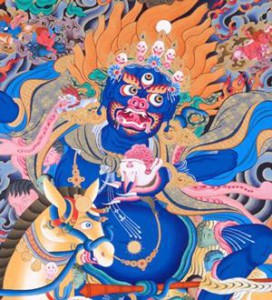Don Season and the Mamo Chants
February 9, 2016 is the beginning of a new Tibetan (lunar) year, the year of the Fire Monkey. The first day of the Tibetan year is known in our sangha as Shambhala Day, also known as “Losar.” Many times, but not always, the Tibetan New Year and the Chinese New Year coincide.
It is said that the last days at the end of the Tibetan year are marked by a propensity to lose one’s mindfulness, and as a result we can have accidents and mishaps. Such loses of mindfulness are referred to as attacks by “dons.” Because of such losses of mindfulness, we act in ways that are not kind to oneself, to others, or to the environment.
The Don Season
Anyone who has had contact with a Shambhala Center or a Shambhalian has probably heard about the “don season” and “mamo chants.” What do these mean?
The period of ten days preceding Shambhala Day is referred to in our sangha as the “don season,” because such sudden loses of mindfulness can be more common – and is a time during which it’s recommended that we don’t begin any major undertakings such as extensive travel or big changes of life, but keep life simple and be very mindful, do a lot of practice.
Click here for the mamo chant schedule.
(Please note that a special session will be held January 31st at 11:00am when Shastri Debbie Zarate offer some teaching about the Mamos before leading the chant session.)
Pacifying the Turmoil of the Mamos
It has been customary in our sangha to recite a chant called “Pacifying the Turmoil of the Mamos” during this time in order to pacify the karmic causes of personal, social, and environmental chaos accumulated through the year due to such unmindful acts. The chant says:
“When children do not listen to their parent’s words,
An evil time, when relatives quarrel,
When people dress sloppily in clothes of rags,
Eating bad, chea p food,
p food,
When there are family feuds and civil wars,
These provoke the black mamos’ wrath,
And various women fill a thousand realms,
Sending sickness upon humans and beasts.
The sky is thick with purple clouds of sickness.
They incite cosmic warfare.
They destroy by causing the age of weaponry.
Suddenly, they strike people with fatal ulcerous sores.”
The Vajradhatu Practice Manual says mamos are “… wrathful goddesses usually pictured as furious, ugly beings. They can be dakinis acting as protectors. If reacted to negatively, they appear as fickle, causing all sorts of chaos. If understood positively, they serve as reminders of awareness, almost at the level of discursive thought.”
We pacify the mamos so they will not cause chaos but help us instead. “Pacifying the Turmoil of the Mamos” is an elaborate protector offering. By reciting the chant, we tune into the protector principle of awareness and reconnect with sacred outlook.
It is not the mamos that cause us to “eat bad cheap food, wear clothes of rags,” etc, that’s our own confusion, our dons, at work. We want to banish, or send away the dons that cause us to lose mindfulness (they’re the “bad guys”). The mamos will help us reduce our confusion if they are convinced that is our desire. If not convinced, they visit us with with their wrath, with chaos. In this way, they are protectors.
From the Shambhala Office of Practice and Education, “Remembering that the protectors, or dharmapalas, as well as deities altogether, are nothing else than projections of the richness of our own minds, by supplicating them, we are in fact rousing confidence in our own buddha nature. The function of the dharmapalas, ‘protectors of the truth,’ is to protect us from deceptions and sidetracks on the path, to detect and clear away any obstacles to fully awakening in the phenomenal world.
“Wrathful dharmapalas are known as mahakalas (masculine) and mahakalis (feminine). They are fierce and swift in destroying whatever obstructs the dharma.
How does this protection from these “dons” manifest? Dons operate undercover, by making themselves seem like reasonable parts of our minds. For example, if we’re in a hurry trying to get to a meeting and driving fast but carefully, and a car cuts in front of us abruptly, what could seem more reasonable than leaning on the horn and “flipping the finger” to the offending driver? Wasn’t he or she aware of what they were doing? What were they thinking? They’d better wake up!
By cultivating awareness of our minds, our thinking and our emotions, if a negative emotion arises suddenly we don’t automatically react in a “knee jerk” kind of way but allow a little space between the impulse and the action, hopefully allowing us recollect our basic goodness (and the other driver’s). We could remember that it is helpful (as always) to be gentle and kind toward ourselves and others.




